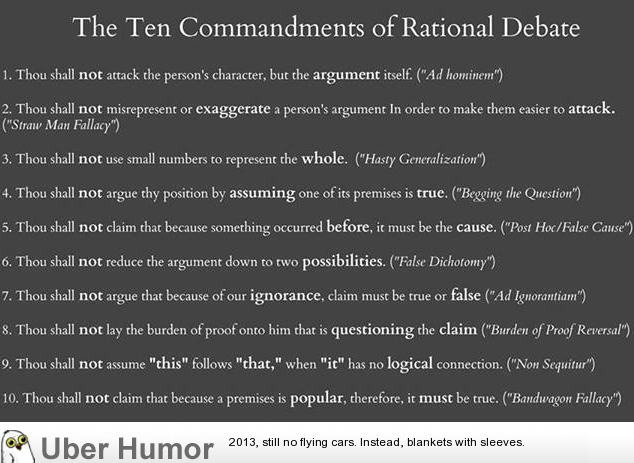As a refresher : the 10 commandments of a rational debate.
Rational arguments seem to be missing in many of the debates here.

|
4
points
To help with this debate, I thought examples are in order. 1. Though shall not attack the person’s character, but the argument itself. (“Ad hominem”)
Example: Dave listens to Marilyn Manson, therefore his arguments against certain parts of religion are worthless. After all, would you trust someone who listens to that devil worshiper?
2. Though shall not misrepresent or exaggerate a person’s argument in order to make them easier to attack. (“Straw Man Fallacy”)
Example: After Jimmy said that we should put more money into health and education, Steve responded by saying that he was surprised that Jimmy hates our country so much that he wants to leave it defenceless by cutting military spending.
3. Though shall not use small numbers to represent the whole. (“Hasty Generalization”)
Example: Climate Change Deniers take a small sample set of data to demonstrate that the Earth is cooling, not warming. They do this by zooming in on 10 years of data, ignoring the trend that is present in the entire data set which spans a century.
4. Though shall not argue thy position by assuming one of its premises is true. (“Begging the Question”)
Example:
Sheldon: “God must exist.” Wilbert: “How do you know?” Sheldon: “Because the Bible says so.” Wilbert: “Why should I believe the Bible?” Sheldon: “Because the Bible was written by God.” Wilbert: “WTF?”
Here, Sheldon is making the assumption that the Bible is true, therefore his premise – that God exists – is also true.
5. Though shall not claim that because something occurred before, but must be the cause. (“Post Hoc/False Cause”).
This can also be read as “correlation does not imply causation”.
Example: There were 3 murders in Dallas this week and on each day, it was raining. Therefore, murders occur on rainy days.
6. Though shall not reduce the argument down to only two possibilities when there is a clear middle ground. (“False Dichotomy”)
Example: You’re either with me, or against me. Being neutral is not an option.
7. Though shall not argue that because of our ignorance, the claim must be true or false. (“Ad Ignorantiam”).
Example: 95% of unidentified flying objects have been explained. 5% have not. Therefore, the 5% that are unexplained prove that aliens exist.
8. Though shall not lay the burn of proof onto him that is questioning the claim. (“Burden of Proof Reversal”).
Example: Marcy claims she sees the ghosts of dead people, then challenges you to prove her wrong. The burden of proof is on Marcy, not you, since Marcy made the extraordinary claim.
9. Though shall not assume that “this” follows “that”, when “it” has no logical connection. (“Non Sequitur”).
Similar, but the difference between the post hoc and non sequitur fallacies is that, whereas the post hoc fallacy is due to lack of a causal connection, in the non sequitur fallacy, the error is due to lack of a logical connection.
Example: If you do not buy this Vitamin X supplements for your infant, you are neglecting your her.
10. Though shall not claim that because a premise is popular, therefore, it must be true. (“Bandwagon Fallacy”).
Example: Just because a celebrity like Dr. Oz endorses a product, it doesn’t make it any more legitimate. 1
point
2
points
You're confusing dating with arguing. Clinging to these commandments in an argument would fairly and reasonably be called a cop-out for those unable to hold their own. Debate is different from argument, and debate is all about rationally presenting each position and questioning the premises, assumptions, reasoning, and conclusion on the other side. It's supposed to result in eventually reach a conclusion, with one side or the other demonstrated as being a generally more reasonable position to hold; a decision making tool, and one that also allows aspects of our own position that we may not examine fully to be looked at with unbiased eyes. In a debate, one side or the other may prove to be the better option, but nobody loses- everybody wins, both (or more) debaters and the audience. The problem is when one tries to apply the debate format to something that is fundamentally subjective, or when an individual stoops to fallacies (such as most of these) rather than reasoning in what is supposed to be a debate. It turns into an argument, and there is only one winner- and it's a shallow win, because who knows what the better option is after all that? 0
points
The words a rational debate presumes the participants are interested in what CreateDebate is all about "ideas, discussion and democracy........to provide our community with a framework that makes compelling and meaningful debates easy to create and fun to use". So they have set the scene and all we have to do is just get on with it, having rational debates about rational topics. And, again, I will place my own in the previous discussion that we had on this: 1) Be aware of cognitive biases. Well all have them. 2) Understand the basic principles and functions of logic (formal and informal). 3) Question everything, even "common knowledge" that we often take for granted. 4) Ensure that you've completely understood your fellow debater's claims before you refute them, if not, ask for clarification where needed. 5) Avoid writing angry responses, if you can help it. You don't want to be "that guy". I must assume that either you didn't read my post in it's entirety, or failed to recognize and/or appreciate the opposing message expressed by my alter ego. Either way, we wish you good fortune but would suggest that you cease to issue your unrealistic and pretentious instructions on how you feel a debate should be conducted . If at any time I feel like insulting someone, such as a pompous dirt ball like you, then that's exactly what I'll do, and all your embarrassing, 2 cent, home spun philosophical drivel sure ain't going to change anything one iota. Instead of spewing out your affected nonsense try yodeling up the canyon, or some other such pastime more commensurate with your arrested intellect. The question is, do you think that calling someone a pompous dirt ball or anything else helps your argument? If you think it helps make your argument stronger, you may want to think about that. If you don't think it helps your argument, but you are just doing it to speak your mind, then I am with you on that. Leaving the pointless and unwarranted , but nevertheless, amusing, name calling out of the equation, it is wrong for some egotistical, self appointed pseudo legislator to concoct a set of juvenile and fanciful notions which he/she feels should form the sole format for all debate participants. Everyone expresses themselves in their own individual manner and shouldn't be subjected to the expression stifling impositions of some Don Quixote type character's personal concept of how people should conduct themselves when responding to issues which are of interest to them. If a respondent feels particularly passionate about a specific topic he/she may be more inclined to include some emotionally driven terms in their expressed opinion than they would otherwise do. Such ''colourful diversity of expression is what makes most forums, be they live, or cyber, more exciting and less predictably dreary. However, be conscious of the fact that it's not what you write, say or think that is important, it's only what you do that matters. I ran my own business for 36 years with a full time workforce of 50 to 60 full time employees, (numbers fluctuated with workload), and it was interesting to distinguish between the talkers/writers and the ''doers''. When the starry eyed ''talkers'' submitted their impressively written, but usually ill thought out, ''brilliant idea'' to me I always responded by saying, don't tell me show me. Their ideas were of course for others to pursue, but not them. Whilst I was chairing a meeting on how best to proceed with the marketing of a new government contract my, poorly educated, but all action foreman entered the room with a clutch of high value orders. Forums of this nature are for retirees or to help the useless non achieving dreamers feel slightly important. But, it's all good clean fun. 0
points
You're confusing the difference between liking or caring about someone, and maintaining a clear, direct debate structure. They aren't different sides of the same coin because the former keeps the latter from happening, and the latter clarifies the former. You can feel any way you want towards someone, but if you let that into the point you're discussing, you won't be addressing your point clearly, succinctly, or thoroughly for everyone to understand. The rules posted here are for maintaining logic as you pursue your point, and they are adequate but not exhaustive in doing so. It's great that you have passion in the spirit of debate, but try not to let that compromise the spirit of debate; debate is not a place for you to insult people who don't accept what you say is true, it's for you to demonstrate what is true without attempting to speak for other participants unless they ask you to. |

